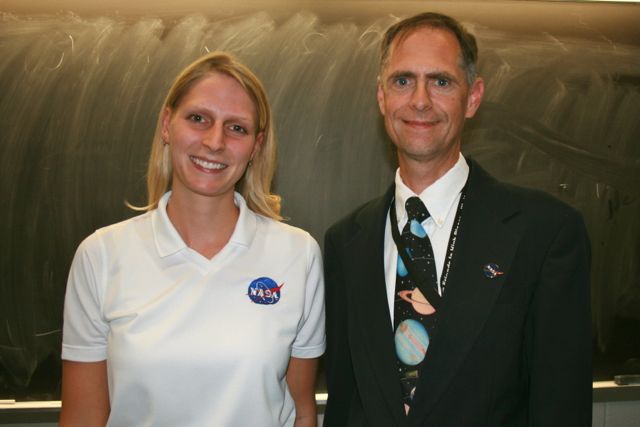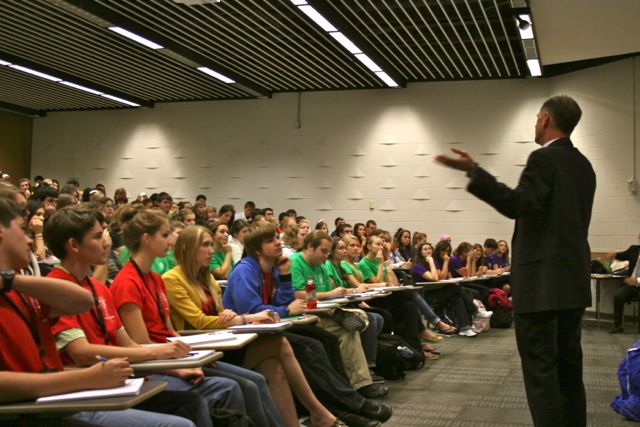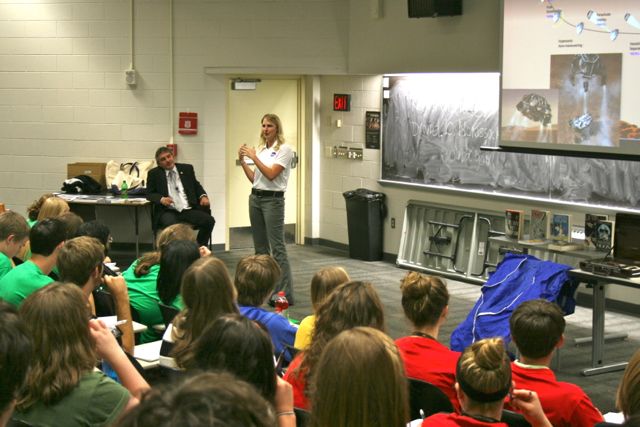 |
| NASA engineers Kathryn Trase and David McKissock spoke at Oakland. |
Earth is not enough for Oakland University Honors College students. As part of the fall 2012 freshman colloquium, “Making Discoveries,” two NASA engineers brought their perspectives and experiences of the pursuit of knowledge, human achievement, and the future of space exploration to campus.
“Space travel is literally about going beyond, going further,” said Dr. Graeme Harper, director of The Honors College. “It has always been about making the impossible possible - since humans first fantasized about the possibility of breaking free of gravity. It has been about being courageous and about making informed choices, and about being creative and about being adventurous.”
David McKissock, aerospace engineer, and Kathryn Trase, systems engineer, spoke about the past, present, and future of the space program, including the recent passing of astronaut Neil Armstrong, the Curiosity Mars rover mission, and possibilities for future manned space flight.
The pair travelled from the John Glenn Research Center in Cleveland as part of NASA’s community outreach program, the Speaker’s Bureau.
McKissock has been at NASA since 1983, working through both the Space Shuttle Challenger and Columbia disasters. He offered insights into the Apollo missions, describing famed astronaut Neil Armstrong’s work and the impact the moon landing had around the world. He outlined the end of the shuttle program and discussed human presence in space through the International Space Station.
“If you really want to be a discoverer,” he told the class. “You must take risks. You must lose your comfort zone and accept that you may not see home for quite a while. Being a discoverer is not always easy.”
Discussion of NASA’s planetary science missions fell to Trase, who has been at NASA since 2011, following work as an intern and student co-op. Trase works to develop radioisotope generators for space applications, focusing on the Curiosity Mars rover and a planned future Europa mission to one of Jupiter’s moons.
She described the engineering and effort that went into hurling the 2,000-lbs Mars rover across 300 million miles of space to enter a new atmosphere and land on a very small target, saying, “The engineering here is ridiculous. It is really exciting to be able to accomplish something like this. We hope to make discoveries that will answer questions we have if Mars can or does support life.”
There are currently 67 major operating NASA science missions in progress now, as well as the many possibilities that exist in the realm of commercial space flight through companies such as SpaceX and Boeing.
“Space exploration is a great example and metaphor for the height of what humans can achieve,” Dr. Harper explained.
Mathew Bloom, a freshman honors student from Midland, was excited to begin the colloquium and his first year in college by learning about space.
“This whole event was interesting,” he said. “I have always been fascinated by space. I have not yet chosen a major, but I am considering going into a type of engineering that would be related to space. This is an especially exciting time to get involved, I’ve been following the Curiosity mission on my own time.”
The “Making Discoveries” colloquium is focused on the process of discovery in fields such as the arts, technology, and medicine, as well as individual and team excellence. After beginning with a focus on space, science and technology, the course will soon branch into literature and the arts, with a trip to a play and discussion with the director.
This year marks the largest incoming class of Honors College freshman in university history. For more information about programs and events in The Honors College, view the website at
oakland.edu/hc.



